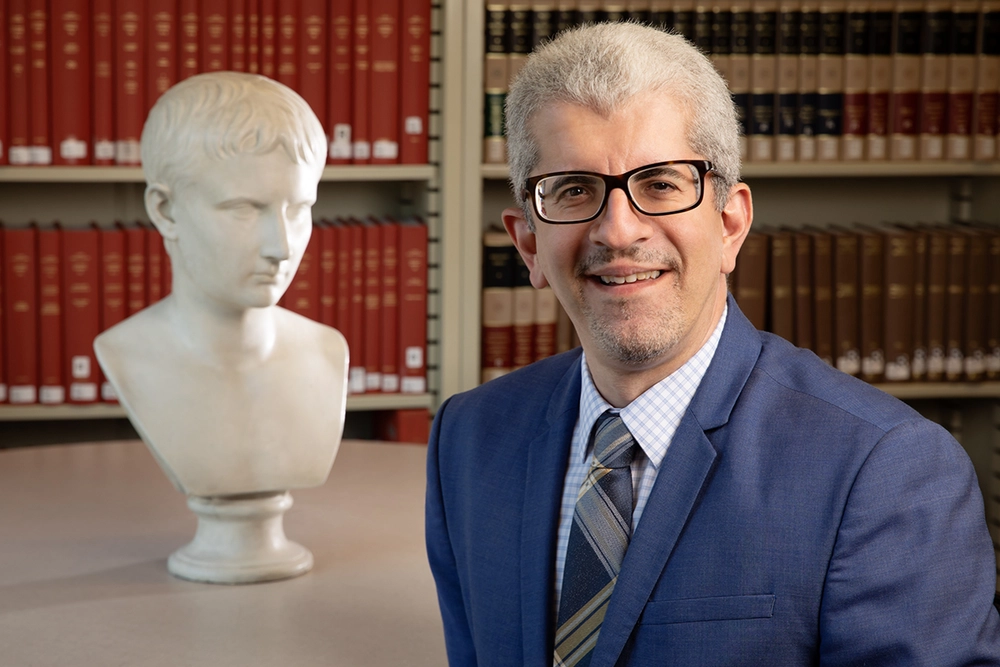
It’s been a busy year for Antony Augoustakis, professor of classics and interim director of the School of Literatures, Cultures & Linguistics. Along with taking over leadership of the school for the fall semester, he also published four books, all projects that have been several years in the works.
They range from a volume of essays published on the 2018 BBC One and Netflix television series Troy: Fall of a City to commentary on epic poems such as Valerius Flaccus' Argonautica and Silius Italicus' the Punica.
We recently caught up with Augoustakis and asked him about how he balances the different aspects of his work.
Can you describe your work within the school and your field?
I am the interim director of SLCL for Fall 2022, and I served previously in the positions of associate director of SLCL and before then as head of the Department of Classics. My research focuses on representations of mother and gender dynamics in first century CE Latin literature, and in particular, epic poetry in the period, that is, poetry related to Roman history or Greek/Roman mythology but with relevance for the current times of the period, especially under the Flavian emperors, Vespasian, Titus, and Domitian (69-96 CE).
What impact do you hope to have on your department and field?
At the Department of Classics at Illinois, we have a very strong profile in Flavian studies, my area of expertise, and many of my graduate students are now in positions at other universities and colleges around the U.S. and abroad. The department has organized a number of international conferences on this area of expertise, and we have attracted an excellent host of speakers from around the U.S. and abroad to participate. In addition, I am a leading expert in classical reception studies, which is another area where Illinois is in the forefront of research in classics in the U.S. My most recent four books published in 2022 all focus on Flavian studies or matters of classical reception, and they all open new ways of looking at texts and other media on topics relating to gender, sexuality, motherhood, diversity, and racism in the ancient world.
You’ve had a busy year. How do you balance all of these projects, and are there ties connecting the different works?
All four books published this year originated from projects that had started in 2019.
My first book, Silius Italicus: Punica Book 3, Oxford 2022, co-authored with J. Littlewood (Oxford), looks at a Roman enemy, Hannibal, the Carthaginian general who launches a huge military attack against the Roman empire in 218 BCE. The book examines material culture re. the crossing of the Alps by Hannibal’s army, the representation of his wife and child, a geographic/ethnographic make-up of his army, through the lens of an epic poet at the time, Silius Italicus.
Related to this is an edited collection of essays co-published with M. Fucecchi (Udine, Italy), Silius Italicus and the Tradition of the Roman Historical Epos, Brill 2022, from a 2019 conference in Italy examining among other things how the poet Silius addresses matters of diversity, representation of foreigners etc.
In my third book, Valerius Flaccus’ Argonautica Book 8, Oxford 2022, I turned to an examination of women and particularly Medea, the sorceress from the east who follows Jason to Greece abandoning her fatherland.
And similarly in an edited volume (with M. Cyrino, University of New Mexico), Screening Love and War in Troy: Fall of a City, Bloomsbury 2022, we looked at Netflix’s 2018 series Troy Fall of a City, and in particular how the series about an ancient myth, the war of Troy, based on Homer’s Iliad, still appeals to modern audiences.
What do you enjoy most about your work?
I believe what excites me about my work is how relevant these topics are thousands of years after antiquity.
What’s your proudest achievement?
Being able to publish four books in a year has been a lot, but I am very proud of all of them and am excited to see the response to these publications. I’ve enjoyed working with my coauthors and coeditors from around the world.
What’s next for you?
I expect the publication of two more books in 2023. One is a collaboration with graduate students from the U of I who received their PhD in classical philology under my direction in 2019 and 2020.
Dania De La Hoya Rojas